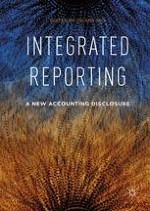2016 | OriginalPaper | Chapter
10. Institutional Determinants of IR Disclosure Quality
Authors : Marco Fasan, Carlo Marcon, Chiara Mio
Published in: Integrated Reporting
Publisher: Palgrave Macmillan UK
Activate our intelligent search to find suitable subject content or patents.
Select sections of text to find matching patents with Artificial Intelligence. powered by
Select sections of text to find additional relevant content using AI-assisted search. powered by
